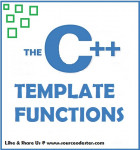C++ Template Functions
This source code is written in C++ and it is a simple code. The template functions are actually a bit easier to use than template classes, as the compiler can often deduce the desired type from the function's argument list.
- Read more about C++ Template Functions
- Log in or register to post comments
- 374 views










